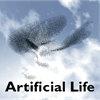感知、执行和交流如何影响仿真模块化机器人集体智慧的形成。
IF 1.5
4区 计算机科学
Q4 COMPUTER SCIENCE, ARTIFICIAL INTELLIGENCE
引用次数: 0
摘要
模块机器人是由简单的实体代理(即模块)组成的集合体,模块之间相互影响,从而实现复杂的行为。每个模块感知环境和执行动作的能力可能有限;然而,通过协调行为和可能的信息共享,模块可以集体执行复杂的动作。原则上讲,单个模块的执行、感知和通信能力越强,模块集合就越有效。然而,能力越强,控制器也就越复杂,因此在通过优化手段设计控制器时,搜索空间也就越大。在本文中,我们分析了感知、执行和通信能力对模拟模块化机器人获得良好控制器的可能性的影响,也就是能让机器人表现出集体智能的控制器。我们考虑了模块化软体机器人的情况,模块之间可以收缩、扩张、连接和分离,并让它们面对两项任务(运动和打桩),用进化计算优化它们的控制器。我们发现,有限的能力往往并不妨碍机器人成功完成任务,我们对这一发现的解释是:(a)有限的执行、感知和通信能力对应较小的搜索空间,这使得优化更容易;(b)对于这种机器人,形态计算发挥了重要作用。此外,我们还发现,更重要的是机器人在面对任务时需要表现出的集体主义精神。本文章由计算机程序翻译,如有差异,请以英文原文为准。
How Perception, Actuation, and Communication Impact the Emergence of Collective Intelligence in Simulated Modular Robots
Modular robots are collections of simple embodied agents, the modules, that interact with each other to achieve complex behaviors. Each module may have a limited capability of perceiving the environment and performing actions; nevertheless, by behaving coordinately, and possibly by sharing information, modules can collectively perform complex actions. In principle, the greater the actuation, perception, and communication abilities of the single module are the more effective is the collection of modules. However, improved abilities also correspond to more complex controllers and, hence, larger search spaces when designing them by means of optimization. In this article, we analyze the impact of perception, actuation, and communication abilities on the possibility of obtaining good controllers for simulated modular robots, that is, controllers that allow the robots to exhibit collective intelligence. We consider the case of modular soft robots, where modules can contract, expand, attach, and detach from each other, and make them face two tasks (locomotion and piling), optimizing their controllers with evolutionary computation. We observe that limited abilities often do not prevent the robots from succeeding in the task, a finding that we explain with (a) the smaller search space corresponding to limited actuation, perception, and communication abilities, which makes the optimization easier, and (b) the fact that, for this kind of robot, morphological computation plays a significant role. Moreover, we discover that what matters more is the degree of collectivity the robots are required to exhibit when facing the task.
求助全文
通过发布文献求助,成功后即可免费获取论文全文。
去求助
来源期刊

Artificial Life
工程技术-计算机:理论方法
CiteScore
4.70
自引率
7.70%
发文量
38
审稿时长
>12 weeks
期刊介绍:
Artificial Life, launched in the fall of 1993, has become the unifying forum for the exchange of scientific information on the study of artificial systems that exhibit the behavioral characteristics of natural living systems, through the synthesis or simulation using computational (software), robotic (hardware), and/or physicochemical (wetware) means. Each issue features cutting-edge research on artificial life that advances the state-of-the-art of our knowledge about various aspects of living systems such as:
Artificial chemistry and the origins of life
Self-assembly, growth, and development
Self-replication and self-repair
Systems and synthetic biology
Perception, cognition, and behavior
Embodiment and enactivism
Collective behaviors of swarms
Evolutionary and ecological dynamics
Open-endedness and creativity
Social organization and cultural evolution
Societal and technological implications
Philosophy and aesthetics
Applications to biology, medicine, business, education, or entertainment.
 求助内容:
求助内容: 应助结果提醒方式:
应助结果提醒方式:


